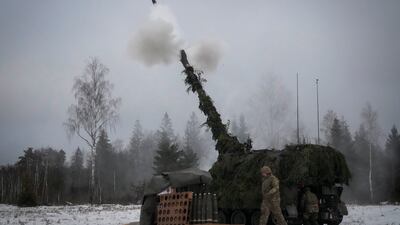Nato allies are drawing up plans to strengthen their defences in the three Baltic states particularly exposed to Russia.
Britain, Canada and Germany are poised to pool their efforts to protect the ex-Soviet states of Latvia, Lithuania and Estonia.
This will include synchronising military exercises by the three Nato battlegroups that the western allies lead in the region.
The Nato battalions — led by British forces in Estonia, German troops in Lithuania and Canadian soldiers in Latvia — are being upgraded to brigades because of the Russian invasion of Ukraine.
The six allies drew up a deterrence plan as Nato defence ministers met in Brussels on Tuesday and Wednesday. The meeting ended with Secretary General Jens Stoltenberg saying he would visit Turkey on Thursday in the aftermath of the earthquake there.
German Defence Minister Boris Pistorius said the joint paper covered “how we can defend this particularly exposed part of the alliance especially well”.
“Better co-ordination has a better deterrent effect,” he said.
Fear of Russian aggression is particularly high in the Baltic states because of their proximity to Russia, their history of occupation by Moscow and their small size compared to Ukraine.
“The eastern flank is like the front door of Nato — when the front door is locked, the inside doors could be opened,” said Estonia’s Defence Minister Hanno Pevkur.
“In Ukraine at the moment, 110,000 square kilometres are occupied. Estonia’s territory is 45,000 sq km. We don’t have this luxury to say that we will give away even one metre of our land.”

Nato’s presence in the Baltic region will expand when Sweden and Finland join the alliance, a step that is awaiting ratification by Turkey and Hungary.
Sweden’s Foreign Minister Tobias Billstrom on Wednesday said the country had “delivered results in all areas” of Turkey’s counter-terrorism demands.
Finland and Sweden’s membership would double the length of Nato’s border with Russia, and come as generals draw up a new blueprint to defend alliance territory.
Ministers at the Brussels meeting agreed a broad strategy that will be turned into detailed military plans by Nato commanders.
The guidance "reflects the reality that we live in a more dangerous world" and will drive Nato policy "for years to come", Secretary General Jens Stoltenberg said.
Allies are looking at what equipment they will need to execute Nato’s plans, amid concerns in Britain and Germany about shortages in the armed forces.
A specific plan for the Baltics is being prepared by the Supreme Allied Commander Europe, US General Christopher Cavoli, and will be signed off at a Nato leaders’ summit in Lithuania in July.
British forces in Estonia are currently leading a 1,500-troop drill called Exercise Winter Camp, involving 40 battle tanks and 100 armoured fighting vehicles, according to the UK government.
Mr Pevkur said Estonia was asking for a rotational Nato missile defence, similar to the air patrols already carried out by allied warplanes in the Baltics.
Latvia is meanwhile strengthening its coastal defences and arms procurement, and is working on restoring a form of conscription, Defence Minister Inara Murniece said.
Allies also agreed to set up a special unit for the protection of key infrastructure, after they were unnerved by the explosions on the Nord Stream pipelines.


